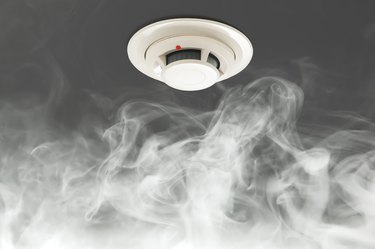
The fire alarm is ringing and ringing, and you need to make it stop. If there's no sign of smoke or fire, you may have to take a few measures to stop a residential fire alarm from ringing. Whether it's ringing at full volume or beeping at regular intervals, there's a reason for the alarm to sound — and you can fix it.
Assume It's a Real Alert
Video of the Day
When the smoke alarm goes off, always assume it is a real emergency. There's plenty of time to figure out if it's actually a warning of smoke and/or fire or a false alarm once everyone is out of the house and safe. Of course, sometimes the reason is obvious, such as burning popcorn in the microwave or if the steam from a hot shower has set off the alarm in front of the bathroom door. In any case, if the smoke alarm is blasting and there's no clear reason, treat it like an emergency.
Video of the Day
Types of Smoke Alarms
There are three different power sources for smoke alarms. Some use replaceable batteries, some use nonremovable 10-year lithium batteries and some are connected directly to the house wiring with a backup battery. In addition to the power supplies, there are two basic fire and smoke detection technologies. Ionization smoke alarms are better at detecting active fires, while photoelectric smoke alarms are better at sensing smoldering fires. Units can use one technology or the other, or you may have combination devices that use both technologies plus an added carbon monoxide detector.
Make the Noise Stop
First, determine which alarm is sounding. Interconnected units all sound during an emergency, while battery-operated units may be standalone or interconnected. Fanning smoke or steam away from a smoke detector often resolves the problem. If the alarm is still sounding, try pressing and holding the reset button for 10 to 20 seconds.
If the reset button doesn't work, try taking down a battery-operated smoke detector and removing the battery. While it's down, change the battery. In the case of a nonremovable battery, take the smoke alarm outside and clean it.
Fire and smoke detectors that are interconnected via the wiring or wireless connections can also be shut off by turning the power off at the breaker box. If the circuit for the smoke detectors isn't clearly marked on the breaker box, turn off all the power at the main circuit breaker. Disconnect each smoke detector from the wiring harness and remove and replace the backup batteries before reconnecting them and turning the power back on.
Move or Clean the Smoke Alarm
Though a ringing fire or smoke alarm may indicate an emergency, it can also be set off by heat from cooking, steam, dust or an errant spider. Once the smoke alarm has stopped sounding off, consider moving it a few feet away from any nearby source of heat or steam, following the manufacturer's installation guidelines.
Turn the power off if you are working with a wired unit and then wipe it off with a microfiber cloth. Vacuum or use compressed air to remove dust and/or spiderwebs and spiders from the unit and sensors.
Fix a Chirping Alarm
Smoke detectors have a life span. If the unit is sounding off with one chirp every minute, it needs a new battery. In the case of a nonreplaceable lithium-battery-powered unit, replace the smoke detector.
When a unit chirps three times, pauses for a minute, or so, and then resumes chirping, it is malfunctioning and should be replaced. A sequence of five chirps every minute indicates that the unit has reached the end of its life. While pressing the test button may quiet the warning for two or three days, it will resume chirping until it is replaced.